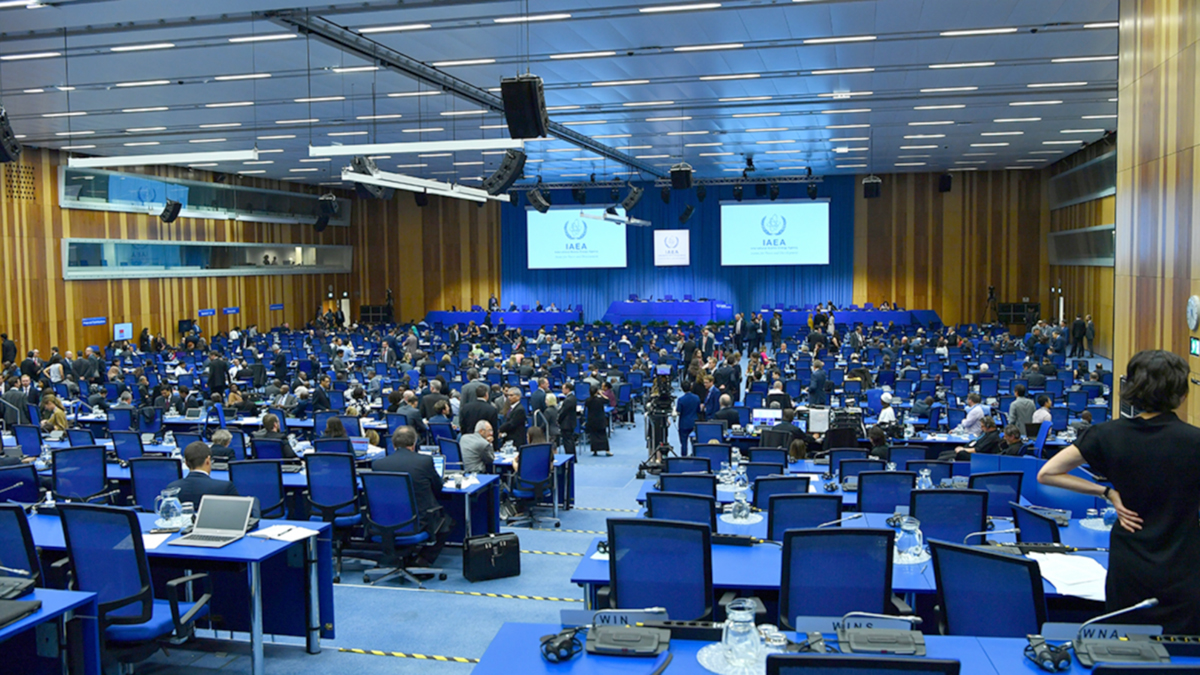16-20 September 2019
Statement By Mr. Muhammad Naeem (Chairman, Pakistan Atomic Energy Commission)
Leader of the Pakistan Delegation
Madam President,
Excellency, Ambassador Alicia Buenrostro Massieu, I would like to congratulate you and other officers on their election at the 63rd Session of the IAEA General Conference. I would also like to assure you of our full support and cooperation.
I wish to convey the deepest sympathy and condolences of my delegation to the Agency and the family of His Excellency Yukiya Amano. His leadership role in steering the Agency in accordance with its Statute and in pursuit of the agenda of Atoms for Peace and Development will always be remembered.
Madam President,
Pakistan continues to utilize the enormous potential of nuclear technology for the socio-economic development of the country and to realize the UN Sustainable Development Goals (SDGs). Nuclear technology applications are being used in diverse areas of electricity generation, health, agriculture, hydrology, industry, environment and basic sciences.
This year during the General Conference, Pakistan is holding an exhibition in the Rotunda to show-case the work it has undertaken in peaceful uses of nuclear science and technology. Many developing countries, including Pakistan, remain vulnerable to adverse impacts of Climate Change. The IAEA should continue promoting the development and use of nuclear technology in mitigation, monitoring and adaptation.
Faced with a severe energy crisis, the decision to expand nuclear power programme was hardly a matter of choice for Pakistan. The nuclear power generation provides a cleaner, cheaper and more sustainable alternative for energy security. Pakistan has been reaping the benefits of nuclear power since 1972 in a safe, secure and safeguarded manner.
Currently, five nuclear power plants are in operation and two 1100 MWe each near Karachi are expected to be connected to the grid in next two years. All civilian nuclear facilities in Pakistan are under IAEA safeguards without any exception.
Our national goal is to expand our nuclear energy capacity to 40,000 MWe as envisaged in our National Nuclear Energy Vision 2050. In order to meet this target, Pakistan looks forward to the removal of the barriers for gaining equitable and non-discriminatory access for the international civil nuclear cooperation.
In the vital area of nuclear medicine, eighteen Nuclear Medical Centers focusing on Cancer treatment are working under Pakistan Atomic Energy Commission and two more are under construction. These hospitals serve nearly one million patients each year. We continue to believe that the choice of nuclear technology rests with the Member States and the IAEA’s facilitation role is extremely important in this regard.
Madam President,
We appreciate IAEA’s Technical Cooperation Program, in which Pakistan has always participated actively for mutual benefits and continues to remain a major beneficiary of the Programme.
Pakistan strongly supports ensuring sufficient, assured and predictable resources to carry out Agency’s statutory responsibilities “to accelerate and enlarge the contribution of atomic energy to peace, health and prosperity throughout the world”. The Agency can play a unique role in promoting nuclear technologies for pursuit of Sustainable Development Goals (SDGs).
Madam President,
IAEA continues to play its due role in coordinating international efforts to strengthen nuclear safety and security. Nuclear security is a ‘State Responsibility’ and In Pakistan, we have developed a comprehensive nuclear safety and security regime. It is regularly reviewed and updated in the light of IAEA guidance documents and international best practices.
The Pakistan Nuclear Regulatory Authority (PNRA), set up in 2001 enjoys complete independence. PNRA continues to review and update its regulations in light of extensive National experience and IAEA standards. During preceding year three additional regulations were issued to this effect. In pursuit of safe use of nuclear technology, PNRA is building capacity of other embarking countries, and has recently concluded an agreement with Nigerian Regulatory Authority under IAEA aegis.
Pakistan has also developed “Regulations on Physical Protection of Nuclear Material and Nuclear Installation (PAK/925)”, which are based on IAEA nuclear security recommendations contained in INFCIRC/225/Rev5. Pakistan’s Centre of Excellence for Nuclear Security (PCENS) has grown into a regional and international hub for nuclear security training and has conducted various IAEA courses with participants from over 45 countries.
As a further demonstration of our commitment towards nuclear security, Pakistan has recently joined Nuclear Security Contact Group by subscribing to INFCIRC/899 and subscribes to IAEA’s Supplementary Guidance on Management of Disused Radioactive Sources. Moreover, Pakistan is also actively considering undertaking an IPPAS Mission at the earliest opportune time.
Madam President
This year Pakistan had the privilege of welcoming Mr. Mikhail Chudakov, DDG Nuclear Energy. DDG NE visited the two nuclear power plant sites in Pakistan and highly appreciated the professional competence of our trained manpower and safety and security measures being taken at our facilities.
Madam President,
In conclusion, let me end by highlighting that Pakistan stands ready to further strengthen its partnership with the IAEA and will continue to contribute to the Agency’s efforts to build capacity in other countries, inter alia, by providing experts and services.
I thank you, Madam President.


